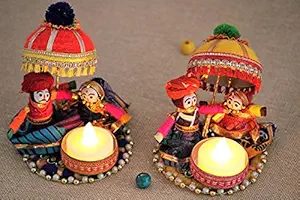चौपाई :
बहुरि बंदि खल गन सतिभाएँ। जे बिनु काज दाहिनेहु बाएँ॥
पर हित हानि लाभ जिन्ह केरें। उजरें हरष बिषाद बसेरें॥1॥
अब मैं सच्चे भाव से दुष्टों को प्रणाम करता हूँ, जो बिना ही प्रयोजन, अपना हित करने वाले के भी प्रतिकूल आचरण करते हैं। दूसरों के हित की हानि ही जिनकी दृष्टि में लाभ है, जिनको दूसरों के उजड़ने में हर्ष और बसने में विषाद होता है॥1॥
हरि हर जस राकेस राहु से। पर अकाज भट सहसबाहु से॥
जे पर दोष लखहिं सहसाखी। पर हित घृत जिन्ह के मन माखी॥2॥
जो हरि और हर के यश रूपी पूर्णिमा के चन्द्रमा के लिए राहु के समान हैं (अर्थात जहाँ कहीं भगवान विष्णु या शंकर के यश का वर्णन होता है, उसी में वे बाधा देते हैं) और दूसरों की बुराई करने में सहस्रबाहु के समान वीर हैं। जो दूसरों के दोषों को हजार आँखों से देखते हैं और दूसरों के हित रूपी घी के लिए जिनका मन मक्खी के समान है (अर्थात् जिस प्रकार मक्खी घी में गिरकर उसे खराब कर देती है और स्वयं भी मर जाती है, उसी प्रकार दुष्ट लोग दूसरों के बने-बनाए काम को अपनी हानि करके भी बिगाड़ देते हैं)॥2॥
तेज कृसानु रोष महिषेसा। अघ अवगुन धन धनी धनेसा॥
उदय केत सम हित सबही के। कुंभकरन सम सोवत नीके॥3॥
जो तेज (दूसरों को जलाने वाले ताप) में अग्नि और क्रोध में यमराज के समान हैं, पाप और अवगुण रूपी धन में कुबेर के समान धनी हैं, जिनकी बढ़ती सभी के हित का नाश करने के लिए केतु (पुच्छल तारे) के समान है और जिनके कुम्भकर्ण की तरह सोते रहने में ही भलाई है॥3॥
पर अकाजु लगि तनु परिहरहीं। जिमि हिम उपल कृषी दलि गरहीं॥
बंदउँ खल जस सेष सरोषा। सहस बदन बरनइ पर दोषा॥4॥
जैसे ओले खेती का नाश करके आप भी गल जाते हैं, वैसे ही वे दूसरों का काम बिगाड़ने के लिए अपना शरीर तक छोड़ देते हैं। मैं दुष्टों को (हजार मुख वाले) शेषजी के समान समझकर प्रणाम करता हूँ, जो पराए दोषों का हजार मुखों से बड़े रोष के साथ वर्णन करते हैं॥4॥
पुनि प्रनवउँ पृथुराज समाना। पर अघ सुनइ सहस दस काना॥
बहुरि सक्र सम बिनवउँ तेही। संतत सुरानीक हित जेही॥5॥
पुनः उनको राजा पृथु (जिन्होंने भगवान का यश सुनने के लिए दस हजार कान माँगे थे) के समान जानकर प्रणाम करता हूँ, जो दस हजार कानों से दूसरों के पापों को सुनते हैं। फिर इन्द्र के समान मानकर उनकी विनय करता हूँ, जिनको सुरा (मदिरा) नीकी और हितकारी मालूम देती है (इन्द्र के लिए भी सुरानीक अर्थात् देवताओं की सेना हितकारी है)॥5॥
बचन बज्र जेहि सदा पिआरा। सहस नयन पर दोष निहारा॥6॥
जिनको कठोर वचन रूपी वज्र सदा प्यारा लगता है और जो हजार आँखों से दूसरों के दोषों को देखते हैं॥6॥
दोहा :
उदासीन अरि मीत हित सुनत जरहिं खल रीति।
जानि पानि जुग जोरि जन बिनती करइ सप्रीति॥4॥
दुष्टों की यह रीति है कि वे उदासीन, शत्रु अथवा मित्र, किसी का भी हित सुनकर जलते हैं। यह जानकर दोनों हाथ जोड़कर यह जन प्रेमपूर्वक उनसे विनय करता है॥4॥
चौपाई :
मैं अपनी दिसि कीन्ह निहोरा। तिन्ह निज ओर न लाउब भोरा॥
बायस पलिअहिं अति अनुरागा। होहिं निरामिष कबहुँ कि कागा॥1॥
मैंने अपनी ओर से विनती की है, परन्तु वे अपनी ओर से कभी नहीं चूकेंगे। कौओं को बड़े प्रेम से पालिए, परन्तु वे क्या कभी मांस के त्यागी हो सकते हैं?॥1॥
Introduction to Khal Vandana
Meaning of Khal Vandana
Khal Vandana is a devotional practice dedicated to honoring and revering the spiritual essence of Khal saints and guides.
Significance in Hinduism
This practice emphasizes devotion respect and spiritual connection with the teachings of Khal saints in Hindu tradition.
Historical Background
Khal Vandana has been performed for centuries to preserve spiritual wisdom and cultural heritage passed down by saints.
Spiritual Benefits
Performing Khal Vandana nurtures devotion inner peace and a deeper understanding of dharma and moral values.
Role of Saints
Saints honored in Khal Vandana act as spiritual guides imparting knowledge and moral guidance to devotees.
Key Chants and Hymns
Popular Mantras
Chants such as "Om Khalaya Namah" are recited to invoke blessings and spiritual energy from Khal saints.
Importance of Recitation
Regular recitation of Khal Vandana mantras purifies the mind and strengthens the devotee's connection with the divine.
Guru Stotram
Guru Stotram dedicated to Khal saints is chanted to honor their guidance and spiritual presence.
Timing for Worship
Devotees usually perform Khal Vandana during morning or evening prayers for maximum spiritual benefit.
Integration with Meditation
Combining Khal Vandana with meditation enhances focus mindfulness and inner spiritual strength.
Practices and Rituals
Daily Worship
Rituals include offering flowers lighting lamps and reciting prayers in honor of Khal saints.
Special Occasions
Dedicated ceremonies during festivals or holy days honor Khal saints and strengthen community devotion.
Offering Respect
Devotees express humility by bowing and offering gratitude for spiritual teachings received from Khal saints.
Community Worship
Group performances of Khal Vandana amplify spiritual energy and enhance collective devotion.
Meditation and Reflection
Post-ritual meditation helps internalize teachings and promotes inner peace and discipline.
Teachings of Khal Vandana
Core Principles
Teachings focus on devotion ethical living humility compassion and spiritual enlightenment.
Path to Spiritual Growth
Khal Vandana guides devotees on the journey toward self-realization and divine awareness.
Discipline and Practice
Regular practice develops concentration patience and moral strength.
Moral Guidance
Saints’ teachings inspire kindness honesty and ethical living in everyday life.
Daily Application
Principles of Khal Vandana are applied in daily routines to cultivate mindfulness devotion and virtue.
Conclusion and Significance
Long-term Benefits
Consistent Khal Vandana practice brings spiritual wisdom peace and devotion into the devotee’s life.
Connection with Divinity
It strengthens the spiritual bond between devotees and the divine essence honored in Khal Vandana.
Community Impact
Practicing Khal Vandana promotes collective devotion and reinforces spiritual values in communities.
Role in Festivals
Khal Vandana is integral to festivals enhancing reverence and cultural continuity among devotees.
Summary of Spiritual Importance
Khal Vandana nurtures devotion knowledge humility and blessings from revered saints.
Khal Vandana is a devotional practice dedicated to honoring and revering the spiritual essence of Khal saints and guides.
This practice emphasizes devotion respect and spiritual connection with the teachings of Khal saints in Hindu tradition.
Khal Vandana has been performed for centuries to preserve spiritual wisdom and cultural heritage passed down by saints.
Performing Khal Vandana nurtures devotion inner peace and a deeper understanding of dharma and moral values.
Saints honored in Khal Vandana act as spiritual guides imparting knowledge and moral guidance to devotees.
Chants such as "Om Khalaya Namah" are recited to invoke blessings and spiritual energy from Khal saints.
Regular recitation of Khal Vandana mantras purifies the mind and strengthens the devotee's connection with the divine.
Guru Stotram dedicated to Khal saints is chanted to honor their guidance and spiritual presence.
Devotees usually perform Khal Vandana during morning or evening prayers for maximum spiritual benefit.
Combining Khal Vandana with meditation enhances focus mindfulness and inner spiritual strength.
Rituals include offering flowers lighting lamps and reciting prayers in honor of Khal saints.
Dedicated ceremonies during festivals or holy days honor Khal saints and strengthen community devotion.
Devotees express humility by bowing and offering gratitude for spiritual teachings received from Khal saints.
Group performances of Khal Vandana amplify spiritual energy and enhance collective devotion.
Post-ritual meditation helps internalize teachings and promotes inner peace and discipline.
Teachings focus on devotion ethical living humility compassion and spiritual enlightenment.
Khal Vandana guides devotees on the journey toward self-realization and divine awareness.
Regular practice develops concentration patience and moral strength.
Saints’ teachings inspire kindness honesty and ethical living in everyday life.
Principles of Khal Vandana are applied in daily routines to cultivate mindfulness devotion and virtue.
Consistent Khal Vandana practice brings spiritual wisdom peace and devotion into the devotee’s life.
It strengthens the spiritual bond between devotees and the divine essence honored in Khal Vandana.
Practicing Khal Vandana promotes collective devotion and reinforces spiritual values in communities.
Khal Vandana is integral to festivals enhancing reverence and cultural continuity among devotees.
Khal Vandana nurtures devotion knowledge humility and blessings from revered saints.


